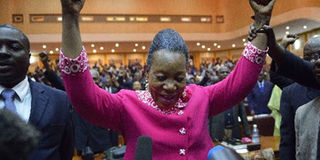C. Africa MPs vote in woman as president

The mayor of Bangui, Catherine Samba-Panza, celebrates after being elected interim president of the Central African Republic on January 20, 2014, in Bangui. Samba-Panza was elected in a second-round vote by the transitional parliament, securing 75 votes against 53 for Desire Kolingba, the son of a former Central African president.
What you need to know:
- The Central African Republic’s new president-elect, Bangui mayor Catherine Samba-Panza, today urged Christian and Muslim militias to lay down their arms to put an end to months of sectarian bloodshed.
- “The people are watching us. We are going to make an important choice for the future of our country,” she said, after relief workers announced finding at least 73 more bodies of people killed in the north since Friday.
The Central African Republic’s new president-elect, Bangui mayor Catherine Samba-Panza, on Monday urged Christian and Muslim militias to lay down their arms to put an end to months of sectarian bloodshed.
“Show your support for my nomination by giving the strong signal of laying down your weapons” to “stop the suffering of the people,” Samba-Panza said in a speech to lawmakers after she was elected interim president in a second-round vote by the transitional parliament.
A second round of voting pitted Ms Samba Panza, against Desire Kolingba, the son of onetime president Andre Kolingba, who left office in 1993.
Some 129 members of the National Transitional Council (CNT), which serves as an acting parliament with 135 members in all, voted by secret ballot to replace Michel Djotodia, who was forced to stand down on January 10 for failing to halt bloodshed.
In the first round of the election, Samba Panza took 64 votes, one fewer than the total needed for an outright win, against 58 for Kolingba. Six other candidates ran for office.
“It won’t be easy” for the new head of state, interim CNT leader Lea Kouyassoum Doumta warned before the poll, urging her colleagues to “spare a thought” for hundreds of thousands of displaced people and those “abandoned” in the provinces.
“The people are watching us. We are going to make an important choice for the future of our country,” she said, after relief workers announced finding at least 73 more bodies of people killed in the north since Friday.
CHALLENGES FOR THE NEW LEADER
The challenge facing any new leader is enormous, ten months after mainly Muslim rebels put Djotodia in power in a coup.
He proved powerless to control fighters of his Seleka coalition and many went on a rampage of killing, rape and looting targeting the Christian majority. Some Christian communities responded by forming “anti-balaka” (anti-machete) self-defence militias and attacking Muslims. (AFP)
Both sides are accused by rights watchdogs of major abuses, and the United Nations has warned of a potential inter-religious “genocide”.
Such inter-religious clashes are unprecedented in the impoverished former French colony, where they have displaced a million members of a population of 4.6 million, while the United Nations estimates that 2.6 million need urgent humanitarian aid.
The country collapsed after mainly Muslim rebels put Djotodia in power last March in a coup. He proved powerless to control fighters of his Seleka coalition and many went on a rampage of killing, rape and looting against Christians.
Some Christian communities responded by forming self-defence militias and attacking Muslims. Both sides are accused by rights watchdogs of major abuses and the United Nations has warned of a potential inter-religious “genocide”.
A CRISIS OF EPIC PROPORTIONS
UN Secretary General Ban Ki-moon on Monday said that the Central African Republic (CAR) is “caught in a crisis of epic proportions”.
“The CAR is in free-fall... We must act together, and act now, to pull CAR back from the brink of further atrocities,” Ban said in a statement read by the acting head of the UN mission in Geneva, Michael Moeller, at a special session of the UN Human Rights Council.
In the capital Bangui, patrolled by troops from French and African contingents based at the airport, Monday’s election was the main topic of conversation in the morning. It also dominated talk in the sprawling tent city near the airport where about 100,000 Christian Bangui residents have taken refuge.
European Union foreign ministers agreed Monday to send about 500 troops to help stabilise the country and back up 1,600 French soldiers of Operation Sangaris, deployed under a UN mandate, as well as the 4,400 men of the African Union’s MISCA peacekeeping force, EU diplomats said.
With fighters still at large in Bangui, local residents repeatedly pleaded for a return to normal life and a new leader who could “restore security” in the nation, whose natural resources have been under-exploited because of instability.
A month and a half after the start of France’s intervention in its former colony, security in the city has gradually improved, but outbreaks of brutal violence still spread fear.
Donor nations are “fully mobilising” with regard to a crisis “which has been ignored for so long”, EU International Aid Commissioner Kristalina Georgieva said after a meeting under EU and UN auspices in Brussels. She gave a figure of $500 million (369 million euros).
However, to deploy foreign troops in the interior of a lawless nation of more than 600,000 square kilometres (232,000 square miles) is a challenge, when residents of isolated regions speak of chaos.
REPORTS OF GROSS VIOLENCE
A team of UN investigators who spent nearly two weeks in the country last month reported a litany of gross human rights violations, including killings, kidnappings, torture and rape.
“The mission received consistent, credible testimony and photographs supporting allegations that anti-balaka mutilated Muslim men, women and children, before or after they were killed,” UN human rights chief Navi Pillay said Monday.
Since Friday, the Red Cross has reported finding 50 bodies in the northwest, while Save the Children said at least 23 Muslim civilians, including three children, were massacred near Bouar as they tried to flee to Cameroon.





